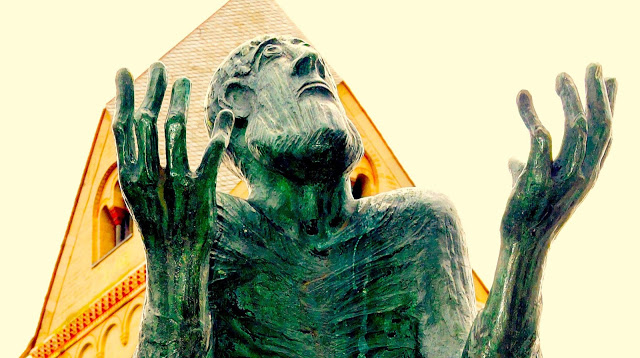Blessed are the poor in spirit, for theirs is the kingdom of heaven (Matthew 5:3).
Let me admit something very difficult for a man to say: Deep down, I am a frightened little boy. That little boy gets an upset stomach, trembling fingers, and a worried mind over many things large and small.
That is also difficult to say as a Christian writer who hopes to heighten attention to grace, to offer encouragement in the name of Christ. The priests in the church I attend, St. Peter’s Episcopal in Rome, Georgia, remind us often that the most frequently repeated command in the Bible is, “Fear not,” or some variant thereof.
Some read those exhortations and conclude that the opposite of faith is fear. Yet, when fears strike me from all sides, something happens that does not square with that dictum. I pray and pray and pray. The prayers seem to spring from somewhere deeper than my will, although my will eagerly grants them entrance. On sleepless nights and breathless days, I seem to know in my bones the truth of these mystical words of St. Paul:
Likewise the Spirit helps us in our weakness; for we do not know how to pray as we ought, but that very Spirit intercedes with sighs too deep for words. And God, who searches the heart, knows what is the mind of the Spirit, because the Spirit intercedes for the saints according to the will of God (Romans 8:26-27).
Then I realize that the fearful little boy in the man has something to teach the man: Life is delicate and fragile. All things less than God in which I take security pass away, and I must suffer their passing. The grace of Christ may be sufficient for me, but sufficient to endure my cross, not to avoid it. Faith absorbs and bears the uncertainty, insecurity, and inevitable pain of life.
The fearful little boy refuses consolation by sweet words and distractions. There is something ironically brave about that. Moreover, without facing the hard facts, what is faith for? “Now faith is the assurance of things hoped for, the conviction of things not seen” (Hebrews 11:1). I cannot imagine arriving at that insight without the instruction of fear that naturally arises from knowing oneself as vulnerable and uncertain in a world of threats.
Amid all the New Testament exhortations to fear not, fear also appears as a companion to a deepening faith. For example, these well-known verses from Paul’s letter to the Philippians:
Therefore, my beloved, just as you have always obeyed me, not only in my presence, but much more now in my absence, work out your own salvation with fear and trembling; for it is God who is at work in you, enabling you both to will and to work for his good pleasure (2:12-13).
This fear and trembling is not about fear of condemnation if one does not get it right. It is about letting the fear that naturally arises in the loneliness and uncertainty of life open our hearts to God. There we find the the faith that God is doing something good, something saving in the silence and the struggle.
Saying that the opposite of faith is fear beats saying that the opposite of faith is unbelief or doubt or some other cognitive category. But the affective category misses the point too. Faith is a relational word, a quality of faithfulness between persons. It involves loving God even when not feeling God’s love, trusting God when comfort seems overdue.
So to me the opposite of faith is indifference, and indifference fears nothing because it does not care.
We have much to fear these days as a nation and world. Meanwhile, in our personal domains, threats arise to health, material security, and relational bonds as always. Read, “Fear not,” as a word of encouragement, so take it to heart, but not as a literal command. Rather, listen to your fear. Let it lead you to prayer. Hear what it teaches you about faithfulness to God. And God’s faithfulness to you even when God is silent. That is the beginning of the wisdom you need for our anxious times and for your own.
Related Posts
Words Written in Stone
Courage, Fear, and the Ambiguities of Life
Suffering Without Shame: How the Second Beatitude Changed MeDr. King’s Antidotes to Fear: Faith
Photo by Bernardo Kastrup of a statue by Hildegard Bienen,
released into the public domain.


If I do not listen to my fear I do not grow into what the fear is saying about me. Fear is saying more about me than what I am fearing.
Very quotable comment, Mike, and those few words spell much work.
Thank you, Marshall, for being courageous enough to share what “the little boy” inside you is teaching you about faith in the midst of fear. The insights shared are an encouragement to the “little child” within each of us as we cling steadfastly to the ONE who promises to be with us and sustain us in and through all things. Such a timely message. Blessings.
I appreciate your joining me in acknowledging the frightened child within and the faithful God who makes power perfect in weakness!